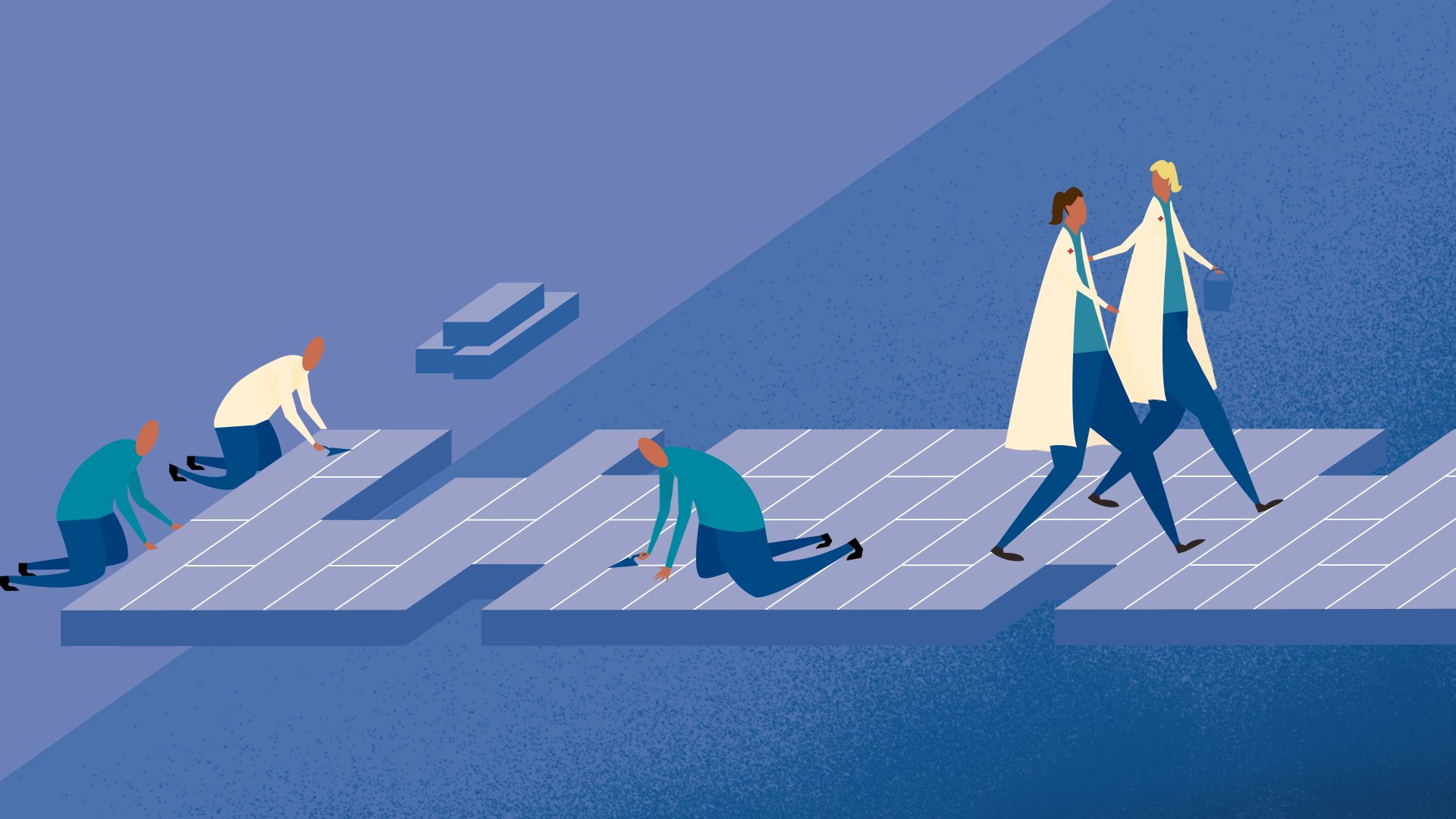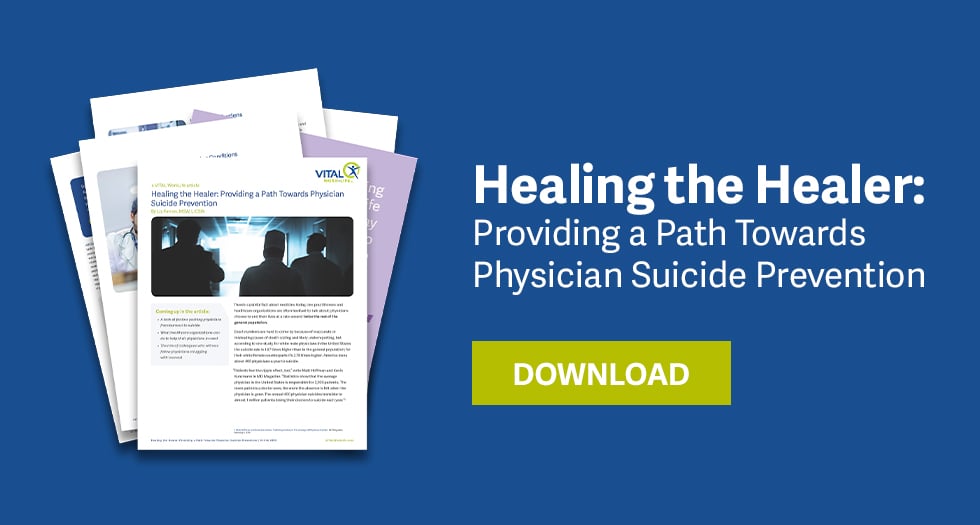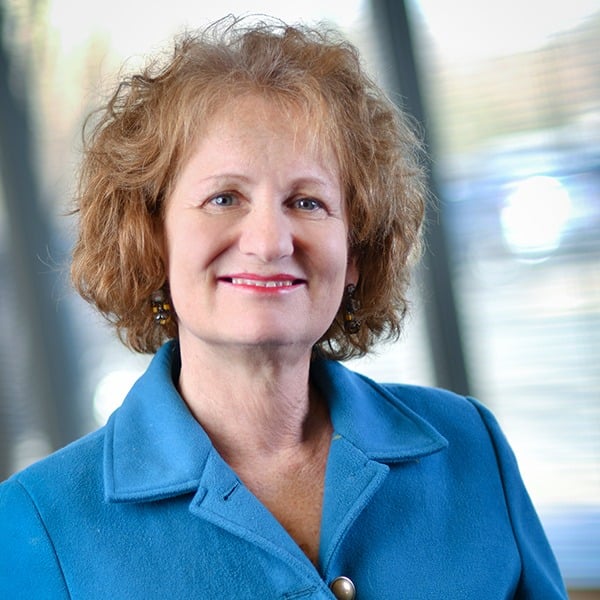 The death by suicide of neurologist Dr. Charles Rohannan in episode one was a pivotal event for the administration and staff of Memorial Hospital. Hoping to turn tragedy into learning and prevention in episode two, the hospital’s leadership worked with Dr. Rohannan’s family to release the news by stages to the hospital’s various communities. At the same time, administration developed a pilot plan to guide discussion of the factors potentially leading to physician suicide: stress, depression, substance abuse and burnout. A confidential mental health program for the hospital’s physicians was also initiated. But, in episode three, one Memorial physician found herself pondering Dr. Rohannan’s act in a darker vein. Stressed, demoralized, losing her faith in herself as a physician and certain her marriage was doomed, Dr. Roberta Lipski was drinking too much and allowing herself to wonder if just letting everything go might be the only road to relief.
The death by suicide of neurologist Dr. Charles Rohannan in episode one was a pivotal event for the administration and staff of Memorial Hospital. Hoping to turn tragedy into learning and prevention in episode two, the hospital’s leadership worked with Dr. Rohannan’s family to release the news by stages to the hospital’s various communities. At the same time, administration developed a pilot plan to guide discussion of the factors potentially leading to physician suicide: stress, depression, substance abuse and burnout. A confidential mental health program for the hospital’s physicians was also initiated. But, in episode three, one Memorial physician found herself pondering Dr. Rohannan’s act in a darker vein. Stressed, demoralized, losing her faith in herself as a physician and certain her marriage was doomed, Dr. Roberta Lipski was drinking too much and allowing herself to wonder if just letting everything go might be the only road to relief.
“There Was Something Else…”
Dr. Lara Harutunian had just finished morning rounds when she spotted Dr. Roberta Lipski at the door of the Leeson Center. She waved to her oncologist friend and Dr. Lipski nodded in return.
God, Roberta looks tired, Dr. Harutunian thought.
“Lunch, Berta?”
Dr. Lipski frowned. “If I can. I’ll text you.” She managed a half-smile and pushed open the door into the Leeson wing.
Yes, she really seems tired, but there’s something else too, thought Dr. Harutunian as she walked on toward Radiology.
Her friend had always been serious-minded, not quick to smile or laugh—the sort of person for whom compassion for the suffering of her patients, and for the suffering beyond the hospital walls, seemed to make it difficult for her to, as we say, “lighten up.” And, of course, Dr. Harutunian told herself, most of us are stressed, overworked, under-rested, and way, way short of time. So okay, Berta is “down.”
But there was something else too. Berta’s seriousness had always been…well, intense and committed. It had energy. That energy always shone through her fatigue—and they sure had been exhausted together many days and many nights in med school—and it had shone through disappointment too. When one of Berta’s patients lost the fight with cancer, it had always seemed to increase Berta’s resolve. But these days it felt different.
These days, there was something missing in Berta—it was her energy. Something in her seemed to be draining away.
Dr. Harutunian knew, in a general way, about what the wellness people were terming “burnout.” It had come up again in the Friday discussions set up after Charlie Rohannan’s death. Burnout wasn’t just being stressed—we all deal with stress every hour, she thought. It was a progressive loss of belief in your effectiveness. It was a state of “what’s the point?”
Was Berta at this point?
In one of the informal discussion sessions that Admin had set up in the wake of Charlie’s death, Helene Antuñez, Memorial’s Physician Wellness Program Director, had encouraged everyone to, as best they could, be aware of their colleagues’ moods— aware of any changes for the worse—and to intervene “with the softest of soft touches,” as she put it, if they were concerned. She pointed out when an organization loses someone to suicide, suicide takes on a reality it normally doesn’t have…
Not that Berta would ever do that, Dr. Harutunian told herself hurriedly. But was she concerned about her friend? The answer was definitely yes.
The Conversation
When Dr. Lipski texted she couldn’t meet for lunch, Dr. Harutunian found a way to be passing by near the door to the Leeson Center at the end of their mutual shift.
“Berta,” she said, and Dr. Lipski turned around.
“Oh, hi, Lara. Look, I’m sorry about lunch,” said Dr. Lipski, with a weary but wary look, as if she were expecting criticism but didn’t have the wherewithal to resist it.
“Oh gosh, no problem,” said Dr. Harutunian. “I just wanted to check in with you to see if everything is all right. You’ve seemed kind of down in the last few days. I just wanted to let you know I’m there for you. I know you’ve been having a rocky time with David…”
“Yes, I have,” said Dr. Lipski grimly as the two of them continued down the corridor.
“I don’t know. I just wondered if there was anything else.”
Dr. Lipski stopped and faced her friend.
“No, not really,” she said. And her eyes began to fill with tears.
“Berta,” said Dr. Harutunian. “you know that whatever is happening, I really care about you as a friend and a colleague.
“I know, Lara, I know, it’s just…” And Dr. Lipski said no more but made a firm effort to compose herself.
“And you know what else?” Dr. Harutunian went on. “I think Memorial is starting to care about us at another level. I think Charlie’s suicide has kind of put things in motion. I really don’t think we have to tough out the bad stuff, the bad feelings, all alone.”
She held out her hand and Dr. Lipski took it.
What’s the end of the story? The story hasn’t ended yet. We know that Dr. Lipski is still working at Memorial. It’s clear her darkest feelings—her “suicidal ideation”— didn’t progress into the more serious “planning” stage. We know that she made use of Memorial’s confidential well being solutions and engaged with a counselor—and she opened up to the counselor, a physician peer coach and to Dr. Harutunian about her drinking and her doubts. The drinking tapered off; many of the doubts remained. But Dr. Lipski discovered she could live with them if she didn’t have to live with them alone.
Did Memorial take a look at its scheduling, productivity demands and whether it was supporting its physicians adequately in charting and other bureaucratic tasks?
This, as they say, is another story.
VITAL WorkLife offers healthcare organizations—no matter what size or where they are in the journey of supporting physician well being—a comprehensive suite of solutions designed specifically to reduce the effects of stress and burnout and improve work/life balance while increasing awareness and implementing measures toward suicide-prevention.
If you’re thinking about suicide, are worried about a friend or loved one, or would like emotional support, the National Suicide Prevention Lifeline is available 24/7 across the United States. Call 800.273.TALK (8255) or CLICK HERE TO CHAT with a counselor.



